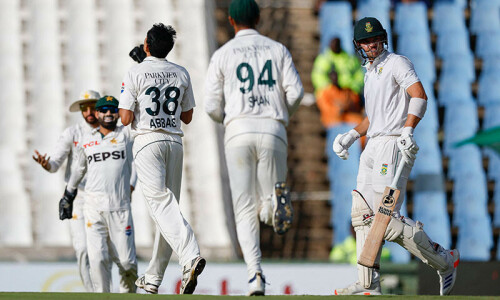Lord’s is the place to be when a Test match is on. The atmosphere is almost electric no matter who is in the opposition. Tickets for the match are bought well in advance and those who are without them are seen dealing with the touts outside the ground.
Once in, the feeling is unique as royalty, rich and famous, cricketers, movie and pop stars and visitors from round the globe mingle with each other and watch some of the great men of the game perform in the middle to take control of the game.
The ongoing third and final Test between England and South Africa is no different except that England in the last three days have been making a desperate attempt to try and keep their Test ranking at the top. But South Africa, already leading the series by virtue of their victory in the first Test, may not let the opportunity slip to replace England and be on the top by the time this match ends.
Yohan Blake, the Jamaican sprinter was here on the first day and so was Brain Lara and Rahul Dravid besides Team GB women’s bronze medallists in hockey in the recently concluded Olympics watching the England captain Andrew Strauss playing in his hundredth Test.
They also witnessed the fighting innings played by young Yorkshireman Jonny Bairstow who unfortunately was dismissed for 95, missing the honour of scoring a Test hundred at Lord’s.
Red-haired Bairtsow had, however saved the England blushes to take them into a narrow lead on the first innings after the hosts were struggling at 54 for four, thus justifying his inclusion in place of discarded Kevin Pietersen.
Bairstow, who made his Test debut earlier this year against the West Indies, must have derived great satisfaction watching the capacity crowd rise for him in appreciation as he walked back to the pavilion. His father David Bairstow, who played four Tests for England, obviously must have been greatly proud of him had he been living.
In 1998 and the age of 46, when his son was only eight, David had committed suicide at his home in Yorkshire. He was under severe depression having found out that his wife was suffering from cancer. A day before he was to appear in a magistrate court on charges of drunken driving, he committed suicide by hanging himself in his bedroom.
He was a jolly little character and a very friendly man.
There have been many cricketers who committed suicides over the years, in fact there are 33 of them, found dead in various circumstances. Most of them were from England, Australia and South Africa.
The last to do so was, of course, the famous cricket writer and commentator Peter Roebuck, 55, who led Somerset and England ‘A’ team and in retirement earned a name for himself as a cricket writer.
Travelling with the Australian team to South Africa in 2011 as a commentator for ABC, he jumped from a sixth floor window of his hotel one day in Cape Town after the police had questioned him over the allegations of sex assault made on a Zimbabwean university student.
In 1965, England’s famous cricket writer R.C.Robertson-Glasgow, who played for Oxford University, had killed himself because of spells of depression that he suffered in his late years.
The Indian radio commentator Barry Sarbadhikari of the fifties had met a similar fate also as he took his life in 1976 suffering from depression.
In the seventies, what hurt most was when news came of the death of Sid Barnes of Australia who many considered was a better batsman than Don Bradman. In retirement he had become a respected cricket analyst. He was on medication for various illnesses and suffered from depression and killed himself with an overdose of medicine.
He was not the only Australian to do that but there was this famous spinner Jack Iverson, who was known to have a very awkward grip on the ball. He helped himself with a shot gun to end his life after suffering from depression as did Jim Burke, the Australian opener who was once among the ‘Wisden Cricketer of the Year’. He also ended his life with a gun shot in 1979.
Bizzare though it may read, these are the facts of history. Various situations do affect people in different ways no matter what they do and where they come from.
Cricketers did have their share of such times too. Those mentioned above are only a few of the many who ended their lives abruptly.
On Saturday, Jonny Bairstow’s slow walk back to the pavilion at Lord’s, raising his bat in acknowledgement of the standing ovation, had not only a lot to do with his shocking exit from the middle when so close to the magical three-figure mark but also, perhaps, in remembrance of his father David who died in a tragic situation 13 years ago and was not there to laud his son’s effort.















































Dear visitor, the comments section is undergoing an overhaul and will return soon.